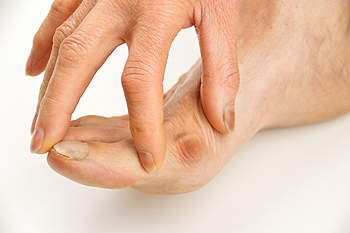Middlefield (860) 349-8500
Wallingford (203) 294-4977
Middlefield (860) 349-8500
Wallingford (203) 294-4977
 It is generally easy to notice a bunion when it has developed on your foot. A bunion is a bump that forms on the side of the big toe that can make wearing shoes difficult for the majority of the day. A common reason why bunions can form is from wearing shoes that do not have adequate room for the toes to move freely in. Additionally, they may form from genetic reasons. If the bunion grows, it can change the shape of the foot, and larger shoes may need to be purchased. Ballet dancers are often at risk of developing bunions because of the constant stress the feet endure while practicing specific poses. Pregnancy can lead to the formation of bunions, which may come from hormonal changes that can affect the feet. Mild relief may be found when a protective pad is worn over the bunion, and this can be helpful in protecting it against friction that can come from wearing shoes. If you notice a bump has formed on your foot, it is strongly suggested that you consult with a podiatrist who can perform a proper diagnosis and offer you correct treatment methods.
It is generally easy to notice a bunion when it has developed on your foot. A bunion is a bump that forms on the side of the big toe that can make wearing shoes difficult for the majority of the day. A common reason why bunions can form is from wearing shoes that do not have adequate room for the toes to move freely in. Additionally, they may form from genetic reasons. If the bunion grows, it can change the shape of the foot, and larger shoes may need to be purchased. Ballet dancers are often at risk of developing bunions because of the constant stress the feet endure while practicing specific poses. Pregnancy can lead to the formation of bunions, which may come from hormonal changes that can affect the feet. Mild relief may be found when a protective pad is worn over the bunion, and this can be helpful in protecting it against friction that can come from wearing shoes. If you notice a bump has formed on your foot, it is strongly suggested that you consult with a podiatrist who can perform a proper diagnosis and offer you correct treatment methods.
If you are suffering from bunion pain, contact Dr. Gordon Fosdick of Affiliated Foot Care Center. Our doctor can provide the care you need to keep you pain-free and on your feet.
What Is a Bunion?
Bunions are painful bony bumps that usually develop on the inside of the foot at the joint of the big toe. As the deformity increases over time, it may become painful to walk and wear shoes. Women are more likely to exacerbate existing bunions since they often wear tight, narrow shoes that shift their toes together. Bunion pain can be relieved by wearing wider shoes with enough room for the toes.
Causes
Symptoms
In order to diagnose your bunion, your podiatrist may ask about your medical history, symptoms, and general health. Your doctor might also order an x-ray to take a closer look at your feet. Nonsurgical treatment options include orthotics, padding, icing, changes in footwear, and medication. If nonsurgical treatments don’t alleviate your bunion pain, surgery may be necessary.
If you have any questions, please feel free to contact our offices located in Middlefield and Wallingford, CT . We offer the newest diagnostic and treatment technologies for all your foot care needs.